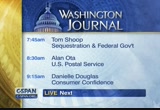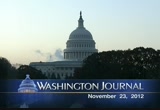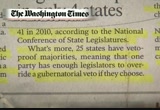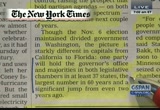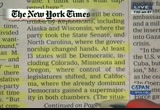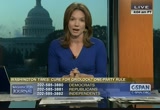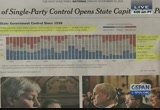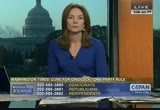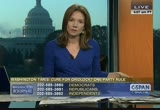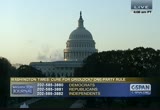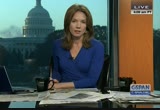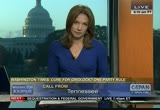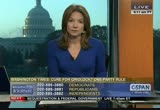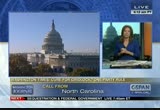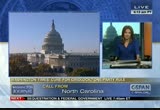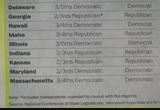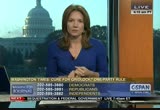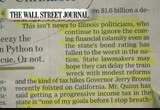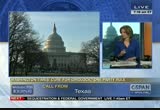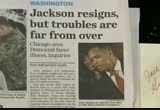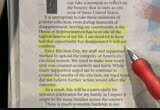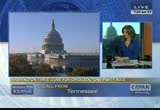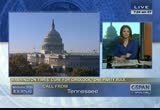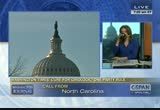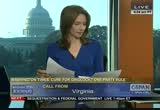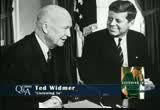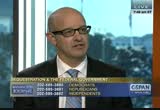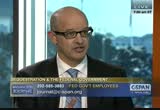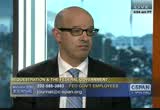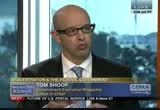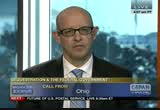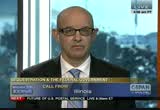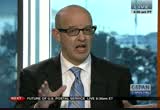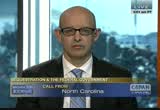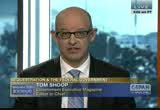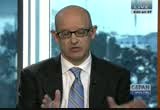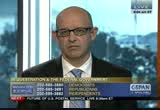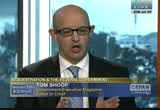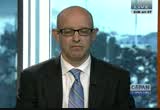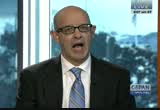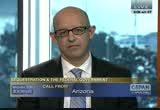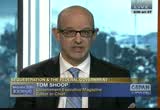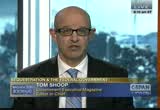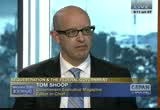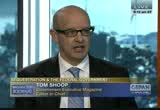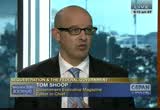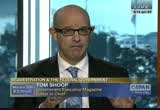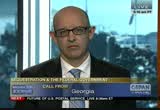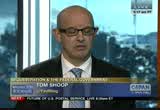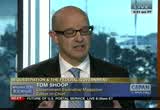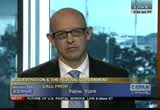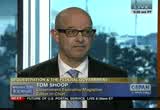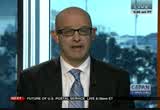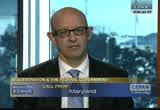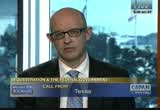tv Washington Journal CSPAN November 23, 2012 7:00am-9:00am EST
7:00 am
confidence. plus, your phone calls -- "washington journal is next. host: good morning on this friday, november 23, 2012. we begin overseas. the cease-fire between hamas and israel has held. in egypt, president mohamed morsi showed his authority yesterday. a startling port grab, freeing himself from traditional oversight. president obama followed through on an annual tradition of calling 10 service members to personally thank them for their service. the washington times and the new york times reporting there are
7:01 am
now more state capitols dominated by a single party that than at any time since 1952. the washington times question, is this the answer, secure for gridlock? we'll get your answers. send us a tweet or post your comments on facebook. also, you can e-mail us. we will begin with the front page of the washington times for our question for all new this morning, there headline --
7:02 am
7:04 am
we want to hear from you this morning. let me give you the phone numbers again. how did you vote in the last election? did you vote with the intention of one-party rule in your state legislature? what are your priorities, if so? let me read this -- on a federal level, folks believe a divided government has republicans in control of the house and democrats in control of the senate and president
7:05 am
obama reelected to a second term in the white house. on a federal level, people believed compromise is possible. not so, says the new york times, on the state level. what are your thoughts on this? we also posted the question on our facebook page. we have a couple comments -- you can post your comments as well on facebook if you want to participate that way, or send us an e-mail or a tweet. this is inside the new york times and they have a chart showing the outcomes of the 2012 elections --
7:06 am
that's how it breaks down. norma is a democrat in st. petersburg, florida. what is your state legislature like and what are your priorities? caller: i voted democratic. i believe that obama offered than did the republican party. the candidate was weak, self- serving. i found him to be untruthful on too many occasions. and the republican party seems unwillingrpe4d their
7:07 am
ness to cooperate, their stance to make obama a one-term president was a real turn off from the beginning of his administration. host: did you vote democratic all the way down the ticket? caller: yes. host: what is your state legislature like in florida? caller: it is pretty republican. host: and you have a republican governor. caller: he has worked to the detriment of the people. host: what if there were -- i'm not sure about your state legislature, if it's all republican in control. caller: i don't believe it's all republican. it is a rather mixed bag,. i think that's a better way to go. i think both sides should be represented. both schools of thought. there should be the ability to
7:08 am
make compromise. host: you think compromise is possible with a divided government more so over one- party rule? caller: i believe one-party rule is a myopic view on most situations. you need both sides to look at something. nothing is one-dimensional. host: but even if it was all democrats? caller: i think we need to change how congress totally operates. i don't think these folks should be in there. i think it is a surge that these people are aggrandized to the degree to which they are. and that the lobbyists have such a great influence on what is going on. and that the american people are not truly represented the way we should be. i guests with the new technology
7:09 am
that is going on, a lot of what congress is supposed to do does not get done and could more readily be done by the american people in a true democracy, whether it be one party, two partiespartyor no parties. host: michelle is an independent in tennessee. the washington times says -- your thoughts on this, one-party rule? caller: let me put it like this, i have been a republican 40 years. with our governor and our legislators going on the war against teachers, they have turned this ex-republican into an independent. host: what are they doing in your state?
7:10 am
caller: they did away with collective bargaining, which really helps improve our educational system here in tennessee. host: when? caller: they did that in 2011. then our lieutenant governor also had the discourtesy to say in 2011 we gave the teachers the appetizers this year and just wait and we will give them the main course. the main course did not come in 2012 election year. i believe it will happen in 2013. this war against the teachers -- i retired in 2007 and i was a teacher that always held herself
7:11 am
up to very strong accountability. i am tired of teachers being the people that are being picked on by some of these republican governors. host: it stays in republican hands in tennessee. the new york times writes this about the concept of one-party rule -- abroad you think that's possible that these republicans in control could overreach? caller: i think they could and i
7:12 am
think it might blow back up in their faces. but the democrats have got to show some strong candidates. and right now there's nothing on the horizon. if you understand. host: i've gotta. -- got it. let's go to kathleen, a democratic caller. caller: thanks for taking my call. i watched this program a lot and i really do like it and i like the questions and answers. the american citizen is what we all are first, not a democrat or republican. and we all have our own lives to live and are all thoughts. i think we are smart enough to get rid of some of the things we think are really wrong. i think that it will happen.
7:13 am
everybody should not be talking about everybody else. host: what do you make of the new republican governor in north carolina? caller: that was the smartest move we ever made. we had one that i did not particularly like. host: what have you heard? what is on the agenda for the north carolina state legislature? caller: i think it's going to be good. i just think there are some people in there this time that have new ideas. that have not been around before. host: you are saying this as a democrat? caller: yes, i was born a democrat. but after i learned about god, i let him tell me who to vote for. good always wins out over evil
7:14 am
even if your not a christian. host: bob is a republican in indiana. caller: it all boils down to the leader at the top. whether it is a company or a presidency. a leader can work with the other party. that has been done many times in our history. if you don't have a competent leader, you will not have somebody to lead. host: what about governor quinn? pardon me, i thought you were in illinois for a second. caller: being able to work with democrats. he was a competent leader, that's all. you look at the states that are really messed up and ask messedwho controls them -- look at the states that are really messed up and look at the
7:15 am
controls them. it's just a matter of having competent leadership. host: let's go to a democratic caller in illinois. al, what do you think about this question? caller: if the elected representatives are not able to or are willing to agree on anything, it should be sent back to the voters for a referendum. there's no reason for this gridlock. if they are not willing to come to an agreement, it should go back to the voters. host: on big issues? caller: on any issue they are on to agree on. host: democratic legislature in illinois, democratic governor. are you happy about this?
7:16 am
7:17 am
what do you make of that? caller: like i said, instead of pushing the can down the road, send it back to the voters and let them decide what should be done. if they are not able or willing to compromise and agree, send it back to the voters. they are the ones that have to make a final decision anyway. host: how would you vote? caller: the pensions that were something that was agreed on, so they should have to be paid, no matter how. those arguments that were made. host: you would agree to raise taxes then? caller: absolutely. host: ray in arlington, texas,
7:18 am
independent. caller: good morning. who says gridlock is bad? i am in favor of gridlock. it keeps the government out of my business. i like the previous caller's suggestion on referendum. when the constitution was passed, i can understand the power of the legislature. but today i think any law passed by the legislature should be turned into a referendum and voted on by all of us with on- line computers and free long- distance phone calls. let the people speak approval of what the congress passes or veto it. host: do you think enough people would get involved in the state conversation like that? caller: i do, on the issues they
7:19 am
are passing now in congress, like spending, spending what they don't have. they're spending my money. the obamacare would never have passed in front of the american people when it was originally proposed and passed by a democratic house and executive branch. i think we have a runaway government that is in too much of my daily living and business. host: on twitter -- you can send us your tweet.
7:20 am
in other news, we told you about the egyptian president, what the baltimore sun is calling as startling call or grab weakening the courts and freeing him from judicial oversight committee deepening political intrigue in the arab world's most populous nation. next to that is the story about the cease-fire, the truce between hamas and israel holding as of yesterday. in usa today there is a piece this morning looking at middle east peace continues to elude u.s. presidents, going through the history of the president's, and their efforts to try to broker peace in the middle east. also this morning in other news, at a congressional level, here is "usa today" with representative jesse jackson jr. --
7:21 am
7:22 am
he said that his lawyers saw no way to the effect the outcome of that recounts in the district. so that's this morning. also, the front page of the washington times has a lengthy piece about the what is causing the recovery in the united states to sputter. so those are some other stories for you this morning. we will keep looking at the newspapers as we get your thoughts on our question for all of you, which is in the washington times and the new york times this morning, front- page stories about one-party rule. the washington times asked if is a cure for gridlock.
7:23 am
looking at state legislatures. michael on the line. caller: thanks for taking my call. i voted democrat in the last election and i have grown to regret. i would like to say this to all the voters out there. whether you are democrats, republican, independent, it does not matter. what matters is the people that elected officials to represent them at government level should insist that they are going to do just that. they should not yield to special-interest groups, they should not yield to contributors. i think the television ads we saw from the presidential election, we were bombarded left and right with pros and cons for mr. romney or president obama. and we don't need that kind of foolishness in america. we need to make up our minds and do what we know is right. that means getting out of votes. and vote for the people you
7:24 am
believe in and why you believe in them. and don't be swayed by the commercials you see on tv. my grandfather gave me good advice that i share with everybody. he said before you plan to argue a point, do your homework. that is just as true with our elected officials. if you are going to support somebody in office -- for an office, do your homework, find out what they stand for, meet them, talk to them, hold them accountable. host: so don't just vote along party lines? caller: exactly. host: in trenton, tennessee, dolly, independent caller. caller: good morning. i agree with the gentleman who just got through talking. once you put people in their, you corrupt them. then when they make decisions you say i will back you up.
7:25 am
don't put people in there and then knock them upside ahead. host: how did you vote in this past election all the way down federal and state? caller: just obama. if people are not in there that should be, i will put them in there. if people are on the rosters that i don't like, i will not vote. . there are people i like, i will vote for them. obama is for everybody. he is trying to represent everybody. host: north carolina, democratic caller in greenville. caller: how are you? you had a caller from north carolina and she said the governor from north carolina, she thinks that he's a breath of fresh air. but i disagree with her. first, beverly perdue, the
7:26 am
governor, she did not do a better job, but she had the deck stacked against her because the republicans were trying to turn north carolina into the way things were 30 years or 40 years ago. what i mean is they cut $1 billion from education in north carolina. the republicans did that. people should be aware of who they vote for. the guy who just got elected for the governor of north carolina, he's not going to do anything, because his constituents, supposed to be all of the voters, but he is going to represent special interest. a caller said people need to do their homework. i agree with that 100%, but i cannot vote for a republican. i have not seen a republican yet that i could vote for.
7:27 am
democrats are not perfect. the problem the president has had with democrats, you have some blue dog democrats that don't vote like they should vote on party lines. you might as well say they are republicans. then theyou have republicans. i don't see how we can survive this fiscal cliff if john boehner does not follow the lead of the president. he said a couple days ago we have to put obamacare in a position to and take some cuts from it. that's crazy. john boehner and mitch mcconnell and all of them have given the president a hard time. that's why we voted for these people and they are supposed to do our bidding, because people are hurting. host: let's take it to the state level in a carolina, state legislature, republican governor, republican. what are the big ticket items they will start working on?
7:28 am
caller: i don't think the governor knows himself. he claimed that he will bring relief to the state. i don't see how he's going to do it. they are going to cut a lot of social programs that they call wasteful spending. people are going to really see what he's made of. what is your name again? host: what is that? caller: pope was the one along with the koch brothers that got it mccory into office. they are bought and paid for. they don't do the people -- everybody needs to be represented.
7:29 am
abr>> we are talking about whether one-party rule would get rid of gridlock on the state level. let the pieces this morning noting that capitals across the country have the most one-party rule on the state level since the 1950's. is that the answer to gridlock, having won party to control the state legislature and the governor's office? we will continue talking about that with all of you for about 15 more minutes. in other news, washington post has this piece this morning about the burial of osama bin laden. more details about after the associated press asked for them through the freedom of information act.
7:30 am
7:31 am
so that is one option being floated with negotiators. also, another option put out there and this is the wall street journal, higher gas tax. the 2010 simpson-bowles dubbed the seduction committee proposed raising the gas tax as part of their overall plan. so those are some of the ideas being put out there for that.
7:32 am
also, in the politics section of the washington times, it says the farm bill may help congress avert the fiscal cliff. this is written by debbie stabenow -- and the washington post has a piece about public opinion -- frank in fort lauderdale, florida. what are your thoughts on this? caller: the solution is quite simple. if the aisle is the problem, do away with it. do it according to state and broke the wishes of the states. there is one party rule, but that party is the american
7:33 am
people as a whole. that's all i have to say. , independent, or norfolk, virginia. caller: a brief statement. if you stand up from behind your desk and if you lean too far to your right, you fall over. if you lean too far to the left, you fall over. the american people are dealing with corporate fascism, the merging of the state and corporations. all the money that is pouring in on every level. it is radical -- whether it is left or right. we need to get to the people's business. and it is the center. that is what i have to say. host: can i get your thoughts on
7:34 am
7:35 am
if you approach it from reason and from fact, there's nothing we can not resolve, in my opinion. we are constantly being whipped on by the media, which is really controlled by big business. we need to awaken to it. i am a white 60 something year- old white southern males. i am appalled. people really are not standing up to this whole voter repression that is going on all over the country. we should be ashamed of ourselves. here we are at this point and we are still struggling with this issue of race. frankly, the folks that support this, this jim-crow nonsense, i grew up in this. and i am appalled by it. host: i will leave it there. our topic, talking about state
7:36 am
7:37 am
on the federal level, the "washington times" reporting on the gerrymandering and gridlock in washington. we are focusing this morning on the state level and one-party rule. those are the stories in the new york times and in the washington times. here's an e-mail -- george and virginia, democratic caller. what do you think? caller: i think that what's going on in washington, it's
7:38 am
really nonsense, because if you are a democrat or republican that is elected to office, you are sent there to do what is best for the people, democrats or republicans. not just for one party or the other. the two-party system is very good. these days they want to protect the party and do there will overdoing the will of the people. it seems once they get in office, they don't care about the public anymore until it comes election time. when it comes to election time, they are blaming one or the other. host: if you are ready to start thinking about the next campaign
7:39 am
election cycle, there are some stories in the newspaper this morning. front page of the new york times, jeb bush. bill clinton has visited there as well as marco rubio. speculation about who might run for president in 2016. and the wall street journal this morning has this headline about the tea party --
7:40 am
possibly try to take them out for not being conservative enough. also, going back to possible 2016 presidential bid, this is from des moines, iowa, in the washington times this morning -- so, possibly doing away with the straw poll. besides story, a marriage supporters now want more, feeling bolstered by a recent win at the ballot box.
7:41 am
if you are interested in that, the "washington times. back to your phone calls. five minutes left to talk about one-party rule, a cure for gridlock? keith is a republican caller. caller: there has been too much government and not enough getting done. they are pulling at each other in the wrong direction. host: even on the state level? caller: yes. instead of getting something done, they fight each other and make everybody think they are doing something. they are not. they have to get to doing something instead of fighting each other. as long as they fight each other, they're not going to get anything done. they want people to think they are doing something for us, but they are not. they get in office and get their
7:42 am
salary and get their pension and they go away happy. host: what is the answer then? caller: after one year, if they don't do anything, they don't get paid. you go to work, you don't do anything, you get fired. the same thing for them. host: richard in georgia, independent. caller: i kind of agree with indiana. one thing that needs to happen is that when they leave office, they need to leave all their benefits. they need to go right back to the public sector, right back to social security and live like everybody else. i don't think they need to have special privileges. nothing other than a regular person. they tell you what you want to hear until they get into office
7:43 am
and then they do with it want to do. host: obama considers corporate funding for inauguration, the headline in the wall street journal. dean in misery, democratic caller. you are the last one this morning. what you make of this? one-party rule, a cure for gridlock? caller: good morning. that is buffalo, missouri. no. when they work for us, they need to come together and work together. the election is over. our governor got reelected here
7:44 am
in missouri. the republicans and the speaker of the house all campaign that they could not work with governor nixon and, but the condition of the state tells a different. he has done a lot for this state. springfield in particular is doing very well. there's a county just below that is 5% unemployment. dallas county where i live, it's pretty high. a lot of people moving out of buffalo, out of the county. they have debunked that. i heard something on the newshour, pbs, that was interesting. it was just a statement, but the mormons and the muslims are teaming up to work for charity.
7:45 am
i hope that's true. now the election is over. evidently, enough republicans like obama that he's back in there. as far as lindsey graham, i don't know why the tea party is trying to get rid of him. he bashes obama constantly. i have two tv sets on to watch them. the election is over. if you have got a problem, get to your representative or senator and ask him to do the business of the people. they work for us. but when they get elected and they think they are our boss. host: we will be talking about getting to work, coming up next, in the fiscal cliff talks. i first want to let you know that first lady michelle obama
7:46 am
will be presented with the official white house christmas tree today. it is a 19-foot fur from jefferson, south carolina that this month.ed they have been presenting the official white house christmas tree for display in the blue room each year since 1966. so that's a little history. coming up next, we will take a look at how the federal government is preparing for the so-called sequestration, the automatic spending cuts to defense and domestic spending. later, a discussion of reforming the u.s. postal service by the end of this year. the u.s. postal service lost $16 billion in the fiscal 2012. many are calling for this congress to do something to reform how the postal service works. those are our topics coming up next. we will be right back.
7:47 am
>[video clip] >> what about the soviet union, khrushchev announced tomorrow that if we attack cuba that it's going to be nuclear war? >> this is such a serious thing that we will be uneasy and things happening. we've got to do something. >> all right. " i would want to keep my own people very alert. >> tell them hang on tight. >> it is amazing that eisenhower tells him to have his people alert, because everyone is completely on edge. and of course kennedy laps. and he says to hang on tight, which is a nice moment that even on this terribly tense day
7:48 am
they're able to joke a little bit with each other, especially during this crisis. i think they have a sense of how lonely it is to occupy that office and how you are getting all kinds of advice. you're getting good advice and a lot of faulty advice, which kennedy was, including from his joint chiefs. eisenhower knew about faulty military advice and he was able to speak with this supreme authority about the dangers as well as the advantages of military advice. so he was a very useful ally of president kennedy. >> the secret white house recordings of john kennedy, with ted widmer, sunday night at 8:00 on c-span. >> "washington journal" continues. host: tom shoop is the editor in chief of government executive magazine, looking at sequestration in the federal government. how was the federal government preparing for possible $1.20 trillion in cuts if no deal is
7:49 am
brokered? guest: it's a mystery, because they're not being very public about what preparations are underway. but there have to been a process of looking at what things will be cut. publicly, what they're saying is as of last month that there were no specific plans or programs under way but that they would have to start sometime soon. that process is in the works. host: here's the headline -- why? guest: the way they say this is they don't want to sequester themselves. that is they don't want to go public with what areas might be cut, because that could have an impact on the process going forward on capitol hill and white house negotiators about what exactly could what exactlyto cuts. they don't want to tip their
7:50 am
hand. host: that's ok with congress that they're not telling them what could be cut? guest: i don't think that's necessarily ok with congress, but it's not something they have a lot of control over. host: there are no laws, nothing from pass negotiations that say they have to say what they are going to do? guest: in september they did have to issue a report on what the impact would be, but the white house simply produced a document that says here is a whole range of programs within the budget and years the percentage by which they will be cut. under the sequester is an equal, across-the-board cuts. but they now done is go down to a level of specificity on how it would impact specific programs. host: which agency is in charge of overseeing all these possible cuts? guest: the office of management and budget at the white house, because they have overall control poll for the federal budget and how it is actually implemented, how the money is spent.
7:51 am
under an actual sequester scenario, it would have to get down to the agency level for them to decide exactly a how the cuts would be implemented. host: what is the omb saying about sequestration? guest: what they're saying first and foremost is it is to be avoided at all cost, that they would prefer this not be implemented. and it is nobody's idea of a good policy proposal. it was specifically designed to be enforcing mechanism to try to get congress and the administration to agree on. long-term budget on this was supposed to be the hammer that was hanging overhead in the event they cannot do it. so no one really wanted this to happen. that is sort of where omb is sticking with their public talking points. host: two reporters for government executives have written in this piece -- guest: yes, for now, that's what they are saying. by the way, those are national
7:52 am
journal materials. they do great work. host: and they get published in "government executive." guest: what they are saying publicly to new spending is normal, because we are into the fiscal year already, fiscal 2013, and the sequester, even if it goes into effect, would not go into effect until january 2. for now, things are essentially going normally. there are some indications agencies are slowing down their spending in the event something happens so they are better prepared to deal with the effects of it. again, but not in public about that. host: what did it mean when president obama at one of the debates said sequestration is not going to happen? guest: it meant mostly than he did not want it to happen, because the white house was very quick to walk that back the next day it is to say that's what he meant, that it's a bad proposal from a policy perspective.
7:53 am
it's not something that he personally has control over whether it happens or not. host: if you are federal employees, what is on the chopping block and what is safe if sequestration happens? guest: again, it is a cut in discretionary spending that goes across the board, roughly 9.4% on the military side, 8.2% on a civilian. there are certain kings that are exempted, veterans affairs spending, for example. -- certain things. military pay and jobs are protected, but not military health benefits. so those are things protected from the sequester, answered other things like social security. and it affects medicare in a different way than the other part of the budget. they cannot cut pay under a sequester. what is the more likely scenario affecting pay would be
7:54 am
furloughs, in the event as a question goes into affect. it's likely there would be widespread --certain chances federal agencies, people would be asked to take time off without pay. host: a hiring freeze? guest: that could very well happen. a hiring freeze and a slowdown in promotions would be two things that would happen probably relatively quickly in the event the sequester went into affect. host: tricare, the health-care system for military personnel, that would be impacted. guest: that would be subject to the same 9.4% across-the-board cut as the rest of defense. tricare for life, which affects military retirees, that is exempted. it does not mean immediately everybody's premiums would increase, but it does mean providers and insurers would be subject to that cut.
7:55 am
that whatever affects on the benefits they provide to the troops. host: how does tricare work right now? guest: tricare is the military's broad health benefits program, the same as the federal employees, or similar to the federal employees health benefits program on the civilian side. it provides health insurance for military service members. host: with getting phone calls. independent caller from massachusetts, marc. caller: good morning. happy black friday. with respect to sequestration, i just learned about it this morning, i guess it is a lot like what happened last year, it just threats and everybody is jumping. in reality, are there not certain cuts that can be made without taking defense jobs or national security jobs? are there not a couple hundred
7:56 am
billion dollars in spending that like research or something that -- the low hanging fruit? guest: there certainly is an argument that there are areas of the federal budget that could be cut without dramatic impact. one thing to remember if it is even if there were a couple hundred billion in those kinds of cuts, that still is far short of what would be subject to being cut under the sequester. that's a total of $984 billion. so it would go much deeper than that. host: i want to show this headline in "government executive_ -" -- what are some of the other tools at their disposal? guest: the impact of the sequestered does not necessarily all take place at once. it is spread out over the fiscal year. it does not mean things have to happen right away. also, agencies have some ability
7:57 am
to reprogram funds so as to mitigate the immediate impact and they can spread things out. what it means is there is not necessarily a moment on timber second and best things begin to be cut drastically immediately. host: this piece -- guest: yes. host: ken, democratic caller in ohio. caller: this problem could be solved very easily if the president would be a strong enough leader. nobody can get their work done from tuesday to there's a. bacon started monday morning, get the congress in there and keep them all week until friday. the i did they have to go home to get close to their constituents is preposterous.
7:58 am
we have plenty of communications systems between them and their subjects out there in their states. but both of these questions could be answered by just getting to work and staying at work until they get the work done. it would be a farce if people in the country went to work on tuesday and thursday and complained about not getting any money. guest: there certainly is work to be done. it is a matter of both sides sitting down hammering out the details in agreement to avoid this, which has been the idea all along, that that is what they were supposed to do to avoid this kind of across-the- board cuts going into effect. they are beginning to do some work on that now. presumably there will be a lot of time spent on this between now and the end of the year. that really is what needs to be done, for both sides to sit down and begin talking about the specifics of a deal that could be made to avoid. this avoid host: independent -- independent caller.
7:59 am
caller: would government employees have to pay a share on premiums? guest: 70% is paid by them already appeared there are proposals on the table that would shift that balance and require the employees perhaps pay a little bit more premiums, but they already pay part of the premiums. host: on twitter -- let me show our viewers this headline in the washington post. are they taking a look at weapons systems as a possible area to cut? guest: absolutely. they already have proposed and planned for major cuts in weapons systems spending over the next 10 years. that is what the military's
8:00 am
position is at this point, that its their position at thiss they gave at the office and cannot be tapped again for another $500 billion. >> can we not cut more from that area? guest: the position is if they cut further as deeply as they talk about it would have a serious effect on military readiness and our ability to do the things we need to do in the future. host: what would the pentagon cut if sequestration happen? guest: 9.4% cut, so it is on the order of $500 billion a little bit more. about half over all, over 10- year cuts in spending. it is a significant cut. host: going back to what we started with, they have not said specifically what they were
8:01 am
looking at or bay -- have given the public some idea? guest: they said, first of all, but would be almost, but -- unavoidable to have furloughs. certainly contracts spending would be cut. the president had an option to exempt troops, the impact on their pay and he indicated he would exercise the option if that happens, so that would not be on the table. but there would definitely be cuts in weapons systems, contract and, and civilian furloughs. host: burlington, north carolina. republican caller. caller: i think we all have to agree -- in a sense that we are all in agreement -- that something needs to happen. but we already have the tools in place. we have bowles-simpson, which was an idea. the fear is that nothing is going to get done until january.
8:02 am
there was little to no talk about cuts in social programs. the thing is, we have seen time and time again -- thank goodness for republican representatives mr. sessions, when he comes out with this report, showing the waste, fraud, and abuse that goes on with these social programs. we have to come to an agreement that it is not just going to come from defense, but it has to come from the bloated social programs that are eating the federal government like it has been eating the states. something needs to be done about that on that side. and it is up to the media to make sure that you educate the people and not just go along with the democratic party. thank you. guest: it is certainly the case congress and the administration
8:03 am
are again waiting for the last minute to get any kind in -- deal in place if in fact a good deal in place. there is definitely work to be done and they are not doing it until they absolutely have to. there are discussions under way before a grand bargain that would include a whole range of spending and not just what is subject to the sequester. trend of a scenario, certainly social programs like social security and medicare would be on the table and there has been discussion about limiting the benefits and taking some cost there, in addition to trying to get more tax revenue. that is definitely on the table. it would be difficult in a lame- duck congress to negotiate a fully fleshed out a grand bargain like that but you may see a situation in which there are short term cut put into place with mechanisms to reach a broader deal like that. there seems to be more momentum lately to reach a large sale agreement, to make an effort to
8:04 am
put this behind us at least for a certain amount of time. host: new york, independent caller. caller: i have an idea for straightening out things are going on with the economy and some -- everything else. we have to separate our federal employees -- state, federal, and local -- and our health care workers from the private sector. if we do this, we can concentrate on mortgages for 6% interest for all the federal and -- and some health care workers. in 30 years we would have $24 trillion. 45 million, 54 trillion -- host: where are you getting the numbers from? caller: because, if we take the war that we have now, $104
8:05 am
billion, and we put it into mortgages at 6% interest rate they would come out to 70 -- $17,000 a year. 20 million employees. which means they would be self sufficient for the rest of their lives, which means you would have 166,000 per employee in interest that would cover the employee you got this -- that is working, the employee does is retired, and his benefits. which would cut down the deficit, cut down just about everything you could think of perry taxes in half, property taxes would be cut. you would have a whole new system. guest: there are certainly a whole range of proposals like this on the table, to shift money around, especially money that has not been spent in the last decade on the wars. there are a whole range of
8:06 am
things that can be done. the current situation, running annual deficits in the neighborhood of $1 trillion, it is quite clear there is going to have to be a whole range of things that is going to have to be done to get the whole -- the number down to something more palatable. host: pensacola, florida, republican. go ahead, laura perry -- laura. caller: first of all, if $1.20 trillion, right, it is over 10 years. is that a real cut or is it a cut in the projected increase? guest: it is a cut in the baseline, so the projected increase. a very good point. in one year, 2009, we increased spending by almost $1 trillion. it was not just a one-time shot. so, we can't cut it in one year's $60 billion -- in one
8:07 am
year, $60 billion? we raised it $900,000,000,000.10 year? that is ridiculous. the military can cut $60 billion. social spending can cut $60 billion. these are projected increases, not cuts. guest: there is definitely a school of thought along these lines saying maybe it is not that huge and level of cuts. the people in the agencies will tell you it would have an immediate affect on their ability to provide services, ranging from border control to air-traffic control. there are scenarios out there when things can get difficult. but there is definitely a school of thought that says we have to take some cuts in spending, we have to do something to get the budget under control, and there are people now saying maybe we should just let this go into effect and take the savings where we can get them -- there is a school of thought it may not be that difficult to cut. host: are her calculations
8:08 am
right? $60 billion a year? guest: i think it is right but don't hold me to it. host: a viewer on twitter -- can that be applied to the federal government? guest: there are some cases it is true. federal agencies to not have a huge amount of discretion on exactly how the spend their money. there may be things some group or another site is necessary but it all comes as approved on capitol hill. agencies have a limited ability to go spend on things that they might want or not want to do. host: craig in tucson, arizona. caller: i am in a firm belief we are sitting at a huge opportunity. sequestration should just go
8:09 am
into effect, and we will be able to get some true tax reform out of it. caller: i hope we actually -- host: heidi, i will come to you next. guest: there is a school of thought is the setting this may be a perfectly fine way going about getting the kind of cuts that need to be done. if you would allow the fiscal clerk to go over it as of january, a whole range of things -- the expiration of the bush pac -- bush tax cut, things affecting unemployment benefits, and a whole range of things -- the payroll tax cut, along with the spending reductions. there are people who believe it would be a well-rounded approach to getting some serious deficit reduction. the problem there is the stock market seems to have indicated that they are skittish about it,
8:10 am
possibly throwing the country back into recession. so, there is great concern on that front -- if we are just allowed to go over the cliff, that that would have a very adverse affect on the economy as a whole. host: now, haiti, you are on the air. salem, massachusetts -- heidi, you are on the air. caller: i would like to see both parties said down and work things out, but you need to definitely -- you know, basically sit-down, working out. the need to be helping of troops that are coming home that have brain injury and other things. host: tom shoop? guest: there is definitely movement in that direction. those who want congress and
8:11 am
white house to sit down and work at the work out a deal, there has been some indication it will take place but there are reasons to be optimistic. veterans spending -- it is important to know that spending on veterans program is -- they will not be affected. host: who are the players talking over a thanksgiving holiday break when they are not in washington? guest: i am not sure they are talking -- but as soon as they go back, the president and people at omb, john boehner on the house side, and harry reid, senate majority leader, meds mcculloch -- mitch mcconnell, mayor daley there. paul ryan recently indicated he will be a major player in the talks. i think the important thing to notice is the rhetoric has softened quite a bit. certainly over last year when
8:12 am
there was just can't other impasse. and in the initial days after the election there was some harding of the provisions but it has softened over the past week and indication there are movements spawned tax revenues and -- programs in an effort to have a deal. host: the topic is the sequestration side of the so- called fiscal cliff talks and there is a tweet that says -- guest: it is definitely not meaningless, the fiscal cliff. there is great meaning in what might happen with going over that cliff. and certainly there are major, major cuts to federal programs on the table that could have a widespread effect. host: and impact on jobs at the federal government? guest: absolutely.
8:13 am
now, it may not impact jobs immediately. first of all, it will take some time for the sequester to go into effect and it is not like the agencies will starts with -- flipping a switch. but things like actually reducing federal employment by a reduction of force, it is less likely because in the near term it actually costs money because agencies would have to pay certain severance costs to employees and would have to pay them for things like unused vacation time. that is unlikely to be something you see in the near term, actual reductions in the federal work force. but the things like hiring freezes and freezes in promotions and furloughs -- host: are the currently under a pay freeze? guest: yes, they are. under a two-year pay freeze which has been extended until march 27, 2013 during president obama proposed a 0.5% increase for 2013 but as a practical
8:14 am
matter it would not go into effect until the last six months of the fiscal year. host: bobby in alabama, democratic caller. caller: i just turn the tv on -- talking about the post office, and this may have been brought up but i don't know. the reason the post office is in bad shape financially, during the bush administration, the lame-duck session, they passed a bill that the post office had -- but retirement system defund the retirement system 75 years out in the future and they had to do it in a two-year. they are putting away money for people in retirement that they have not even hired yet. guest: it is a little bit of a
8:15 am
separate issue but it is a major problem. the postal service is in financial difficulty. $16 million loss this year. and a major part of the problem, as they have said many times, is this pre-funding for health care and retirement costs for their employees and the of looking for a fix for that on capitol hill. host: a question for you on twitter. why would negotiated cuts have less negative impact on growth than cuts mandated by the fiscal cliff? guest: the short answer is because it would not be this meat ax across the board cut, but it may be the same level of cuts, and that might be ok in terms of the overall economy. in terms of the broad economic impact, it is doing everything at once, all the tax implications, the expiration of
8:16 am
the bush tax cuts and apparel tax cut, it is the whole package of things happening that could have a broad adverse affect on the economy. certainly, in order to get the budget situation under control, there are going to need to be serious cuts in the budget and it may be something on the order of what is already in some question. host: georgia, republican caller. you are on the air. caller: i think the problem we face with the fiscal cliff, we elect people to office -- one party makes a pledge with a man and not the people who put them in office. and then the people -- and then when we elect new republicans into office, they take them in a back room and they make them sign the pledge that grover norquist -- they did not pledge
8:17 am
to work for the people. guest: that is a limiting factor in the negotiations, many republicans in the house and senate who signed a pledge not to increase taxes. it does hem them in in a certain way and it is something they all try to work out now. he reported this morning, at talks under way to come up with alternatives to allow them to at least nominally remained true to the pledge while still getting a tax revenues. it is something we have seen a lot of movement on in the past week or week and i have so i believe there is some optimism there. also, there are some similar limiting factor -- not written pledges, per say -- on the democratic side where there is intense lobbying to protect things like social security and medicare in the ongoing talks. both sides do have their limitations. but the pledge is certainly something has the which is very
8:18 am
thehemmed in the republicans. host: the piece you are referring to is from "the new york times" -- seeking ways to raise taxes while leaving tax rates as is. those with the not to raise to the -- the tax rate could say they did not and the democrats could say they've raised the effective tax rate on the wealthy. guest: i want to close tax loopholes as a way of generating revenue without increasing rates. host: michael from oil income independent caller. you for taking me. first, i would like to say two things. i have watched c-span for years.
8:19 am
president obama does not have to do anything. he just needs to sit back and let sequestration take place, let the bush tax cuts expire peering everything worked rate during the bill clinton years -- for eight years we have prosperity, a couple of balanced budgets and the military was a lot smaller, everybody was happy, there were buying tvs and cars and refrigerators. i think president obama -- he holds all four aces in his hand and led it happened -- let it happen. why does that c-span and all the other tv stations -- but i am talking c-span now, why -- president obama has not even been january 20 is when his swearing-in comes in. and we are called already talking about 2016. we haven't even sworn the president and and all we hear about is who is going to be the
8:20 am
next president. to me, that is a major problem. that is all i had to say. host: we were reading the paper this morning, the headlines in some of the papers about possible contenders for 2016. but go to twitter. another tweet for you. guest: well, that could certainly factor in but it is not necessarily i think the whole picture. i think the problem with the sequester cuts is there is just limited flexibility in how they are implemented. if you take an agency like the federal aviation and the station which i think would be subject to a billion dollars of cuts in a sequester, it is not clear what could they effectively exempt, say, air-traffic control from that. it is not something i think many people will want to see it happen. when you negotiate, you do have
8:21 am
the ability to say this is where we are going to say this is where we can afford to take some cuts and this is where we don't want to take a cut. i think most people in both parties think of a better way of doing it than the across-the- board cuts, which were really no one's idea of the right thing to do. they were meant to be a mechanism to force action in coming up with a bigger bargain on spending. host: given the lack of information from all when the and the white house and agencies, how is it in pac -- lack of information from omb and the white house, how is it impacting the lobbyists? guest: they are working overtime to protect their programs, like they always are. and every aspect of this have people lobbying for it and against it. it all depends on who has the most leverage. it is an interesting part of the process. the defense department, for example, has been very
8:22 am
effective and its allies in the defense industry, making the case that further cuts in defense would have a serious impact on defense. there is not the same level of lobbying for cuts on the domestic side of government. you do not see the same level of saying we cannot afford this to happen. you will see more in the coming weeks in terms of the impact of security and health functions of government. but those have fewer people defending them and are therefore more likely to be subject to cuts. host: on the line for democrats, phyllis is joining us from new york. caller: i love your show and i watched all the time barry finally got through. just comments this morning -- why don't we keep america's money in america. and i wanted to head on another thing, with the physical cliff coming with a talking about it -- i am on social security disability, and i have been watching it closely about social
8:23 am
security, why don't we have congress -- for one thing, work together. never mind republicans and democrats and all the crazy stuff. just everybody worked together like it was intended to be. and, two, how about coming down to the level of income that we have to live on what social security and try to live on -- go from there. instead of buying $100,000 automobile, drive something we drive and stuff like that and maybe all try to get along. thank you, and hopefully we can clean this mess up in time before it runs out. guest: there is certainly an area where we need to work together and there has been movement certainly sent to the election. you mention foreign aid, that is a popular area where people say it is the first place we ought to cut. it is important to remember it is a relatively small portion of the federal government so even cutting its deeply, less than
8:24 am
1%, would not make much of an impact in and of itself. host: a viewer on twitter -- guest: there are definitely a lot of people who feel that way, that federal spending is going up and we are not getting the kind of results it would like to get for it. i think a lot of the spending on the part of the government has been pumped into the economy in an effort to lift us out of recession. it was designed to be short-term even though it put us in a rather large hole. but there definitely are a lot of people out there who think the government is not delivering a result the ought to with the money they put into it. the administration is put a lot of effort into trying to focus on results and improving the performance of the program and linking budgeting to the actual effectiveness of programs. so, there has been movement in
8:25 am
the area. but it is a constant area of focus for government. host: new jersey. republican caller. caller: thank you very much for taking my call. what i don't understand -- talking about cutting budgets and this and that, why don't they cut their own budget? the government has been spending people -- money -- vacations, expense accounts. they live very high on the people. why don't they do something about that? guest: one thing to know is under a sequester scenario, pick if you are talking about politicians, funding for congressional offices would also be subject to sequester, i think on the order of $100,000 or so per office that would be cut out. it may be an impetus for them to get work done on this because it will affect them personally. and addition to freezing federal and please, corn this --
8:26 am
congress has frozen its own pay the past several years. host: a viewer says -- and no work, no pay, no vacation. tom, independent caller. good morning. caller: thank you for taking my call. everybody talks about cutting social security and medicare, which us old people paid into but nobody talks about cutting welfare and food stamps when they did not have to pay a thing for that. they are always discussing what they will cut on us. my understanding is that social security does not go against the budget. it was paid into it and they are using it for everything except social security. but why don't they talk about the social services being cut? thank you for taking my call.
8:27 am
guest: at this point everything is on the table. remember, social security benefits and things like food stamps are not subject to the sequester, so neither of those would come under the scenario. but they are certainly on the table in terms of bigger bargain about future spending. and there have been efforts over the past decade or two decades in both programs. certainly there have been welfare reform, welfare to work initiatives, but those are things certainly on the table and the current talks. host: of there is no deal and sequestration happens, who makes the final call on what gets cut? guest: limited capacity for agency managers to implement the cuts. it is written into law that every program and activity is affected equally by the cuts. how exactly go into effect,
8:28 am
there is some leeway. if that happens on the scale it would happen, it would be unprecedented so it is a little hard to tell at this point. but agencies can reprogram certain funds. what we would see it undoubtably is it the testing of the limits of exactly what they can get away with. there were instances where managers got in trouble by -- for excessively reprogramming. it is not an area where they have unlimited authority. but there will be some wiggle room for them to shift money around and hold off on spending certain money and we will see a whole range of things going into affect. host: a couple more minutes left with tom shoop, talking about how the federal government is preparing for sequestration. larry, parkville, maryland, democratic gammer. go ahead. caller: i have always heard -- i am 68 -- i always heard that politics is an art of
8:29 am
compromise. we did not have any artists in washington anymore, it seems like. host: we have to leave it here -- we are getting feedback. on the issue of compromising, is there talk about compromising? yeah, i think there is more possibility certainly if -- guest: i think there is more possibility -- we are currently in a system where it is difficult for the two sides to compromise because they have egypt -- politicians across the spectrum face potential challenges from the far end of their spectrum. if you are a republican member of congress and you are debating what exactly to do it particularly relative to taxes, you have to face the prospect you could get a tea party challenge from your right and that is something you have to be immediately concerned about. the same thing on the left side. it causes people to have more set in stone positions that make
8:30 am
it more difficult for them to compromise. but what the results of the election being relatively decisive and with the recognition that something very bad for all sides would happen if there is not a deal, there is more movement now toward getting something done. host: one last fall called. mark from texas. republican. caller: tom, one of the things sequestration points out that the bankruptcy, you might say, in washington, of being able to reach compromise. i ran for congress for a short period of time and one thing i came up with when i ran was a program called 123 no federal tax plan. what it does is it returns back to the states the idea of raising the share of federal tax based on apportionment. what we were trying to accomplish with this was no
8:31 am
longer did you have to worry about one size fits all. you can let each state reapportionment -- their state of the fed will budget capped at the level called the 2007 tax break. what it did was it allowed each state to decide how they wanted to raise taxes. one of the problems we have -- and i think you pointed out earlier -- right now we have a very polarize -- 24 states are all one party. so many of the other party. but only if you in the middle who are not. this would allow each one to decide what is best for them. can you give comments on what would you think this would be a good program for this country? guest: it is certainly the kind of thing that would be a real game changer in terms of the way tax revenue is generated and apportioned among the states. i think at this point, with as much difficulty there is just coming up with a deal to try to
8:32 am
avoid the sequester and going over the pasqual cliff and the tax publications, i think at this point congress is focused on working in the system as it currently is. these kinds of proposals might get more traction if they make a deal to avoid the fiscal cliff and to get the government's finances in order for at least some short period of time. then you would see more movement on things like this. and i think there is interest in dealing with these questions on a bigger scale right now. but right now there is this immediate problem congress has to deal with. host: tom shoop, editor in chief of government executive magazine. guest: my pleasure, thank you. host: coming up next return to the u.s. postal service under the holiday special -- spending season. they lost $12 billion in 2012 and there are efforts to try to reform the system during the lame-duck session. we will talk about that. and later -- it is black friday,
8:33 am
the traditional shopping day after thanksgiving and cnn reporting black friday sales could exceed $21 billion, from $19.3 billion in 2011. we will be right back. [captioning performed by national captioning institute] [captions copyright national cable satellite corp. 2012] >> with soldiers placed on sentry duty in the roads in and out of boston and guards outside -- the house and outside the homes of crown officials and with british artillery not aimed at the townhouse, the home of the colony's general corp., it was easy to understand why many bostonian felt threatened by the occupation during many more hated how some soldiers tried to stir up racial tensions in their town. of course, not everyone in boston is white. for instance, within months of
8:34 am
their arrival in october of 1768, three british officers, probably drunk, had been discovered encouraging some african-american slaves in boston to attack their white masters. one of the drunk officers, captain john wilson, assured the black bostonian that the soldiers would come here to procure your freedom and with your help and assistance, we should be able to drive all the liberty boys to the devil. while the slaves he was talking to essentially -- ignored but that -- the soldiers' lives, but they were not in boston to free the slaves, several residents marched complaints, that captain wilson and his strong friends engaged in a conspiracy to foment slave rebellion. >> colonial life in british occupied boston, part of a holiday weekend now through monday morning on c-span 3's american history tv.
8:35 am
>> "washington journal" continues. host: we are back with alan ota of "roll call" a senior writer for the publication. recently the postal service announced it lost $16 billion. i am just going to go through the numbers for the viewers. $16 billion loss in fiscal year 2012. operating revenue of about $65 billion, down from 500 million in 2011 -- down 500 million from 2011. expenses climbed because of the health prepayments. and if i% decrease in mail. what is going on with the postal service? yuko while congressional -- while leaders are looking at the fiscal cliff there is a cliff facing the postal service. there is no secret it has these
8:36 am
large, looming fiscal issues. i think there are kind of in a way two schools of thought. one would be the gloomy one of the other would be more optimistic. on the gloomy side, you pointed out there has been a decline in the overall business of the post office. we had obviously the huge increase in the use of technology, whether tweets an e- mail, whether electronic payment systems. there has been an overall decline in the volume of mail. this is been part of what i would call almost a perfect storm that faced the post office depot service since 2006. and as you alluded to, there has been an aging very large workforce within the postal service. projected there will be difficult in meeting some of the retirement payments, specifically health care, pre- funding them going forward. on the optimistic side, we are in the middle of shopping season. black friday, as you pointed out, sales are up.
8:37 am
a good chance of the next few days if you are at the local post office, there will probably be a line. i think it shows there will be a demand for at least some of the services it provides -- whether delivering to the christmas packages or holiday greeting cards or items that are purchased on amazon and teammate -- . -- ebay. but they are searching for is a compromise to bring together the two points of view, to get a stable basis of a concern prize. host: what are the help prepayments of what impact are they having at the u.s. postal service's budget. guest: it has a huge impact. they just reported a loss of about $16 billion on revenues of about $65 billion. the postal service, as you know, is actually larger than fed ex or united parcel service. i think what you have within
8:38 am
the law, probably two-thirds was basically the prepayment requirements which congress imposed back in 2006. wanted them to start looking forward and put money in the banks so they would be able to pay out the health care benefits for the retirees on its work force. that accounts for the lion's share actually of a loss. but still above that, the post office had these operating issues, about $5 billion and operating off losses, and that is where congress is focusing in addition to trying to restructure some of the health care benefits -- helped benefit prepayments required by law. host: let's talk about the house and senate of what they plan to do. there are differences between the two sides. begin with the senate. how would they elector reform the postal service? guest: we had -- they had negotiators coming together, led
8:39 am
by senator joe lieberman and by representative darrell issa from the house, and the senate tends to have, i would say, is optimistic school of thought. maybe the post office after all, maybe it was just going through a rough patch some of the growing businesses, specifically the delivery of packages -- as you know, there has been an explosion of things like delivery of pharmaceutical drugs and political advertising -- the package delivery side is growing. and i think the senate tends to focus on both opportunities for growth. they want to give it a little breathing room. to delay some of the prepayments for health care until later. and maybe they will bounce back. on the cliffside -- on the flip side, the house with a tougher view, a bit more realistic view of the prospects. maybe they are not quite sure whether the postal service will
8:40 am
be viable. if it is viable, fine, you want to give it a little bit of room but not too much. above all, they do not wanted to be a burden on the tax payers intake -- in case it goes through bankruptcy or not able to make payments, we want to make sure the taxpayer does not get stuck with the tab. what they are trying to come together with a plan that will make the postal service be a bit more like a business and yet allowed to continue to deliver a lot of these services. local post office so popular. host: what about saturday mail deliver? guest: buss as a big one. what happened there is senator lieberman is retiring. he would like to get a deal. people on the table sort of a creative idea. you would think that saturday delivery, i did you have it or you don't. senator lieberman came up with a half a solution, from one of the table the idea of maybe we will keep the package delivery
8:41 am
business, which is profitable -- rid of the letter delivery on saturday. and we will see whether or not it will be able to fly. the problem of course is that so many of the lawmakers, they are very sensitive about their constituents and saturday delivery of mail is a popular item so it will be hard for them to give up any of it really. host: what are the prospects of a deal being struck in the house and senate in the lame-duck congress? guest: it was not looking good but in the last week they did get together and start talking and senator lieberman didn't get the compromise out on the table. we are sort of getting hopeful signs. actually with this mini fiscal cliff, if they can work that out maybe it may bode well and be a harbinger for consensus on the big fiscal cliff. host: could be wrapped up in the
8:42 am
larger fiscal cliff talks and the possible deal they might come up with? guest: i suppose it is right. the postal service has been in its own little world since 1971 when it became an independent arm of the government, a semi- independent quasi business off of -- into its own world since 1971. it would have to have its own little section that could be added to the final legislation dealing, the big deal, the grand bargain. host: let's get to phone calls. karen from the illinois. democratic caller. caller: i was wondering why the post office is the only business that has to prepay way in advance? the republicans -- run that throned on a lame duck session? if they would go in and take it away, the post office would not be in the shape it is in.
8:43 am
guest: the caller makes a pretty good point. the negotiators are trying to not eliminated but maybe give a -- reduce the amount of prepayments that are required. to reduce it a good amount -- the majority might be reduced for the next few years. the senate would also reduce its somewhat for the next several years, but give it a little more breathing room. why had they required this? it is just the atmosphere on capitol hill. you would have to pay as you go. any future liabilities would have to be fully funded. you have to make sure the postal service does not leave a big deal that has to be paid to the taxpayers. host: a viewer on twitter add to this -- guest: well, the caller makes a very good points that really it
8:44 am
is sort of a qualified business. it is also an arm of the government. it has several layers of management. wouldn't it be better if it was totally independent? i think that is the direction probably both the members of the senate and house would like to push it. at the same time, it is a very special agency. it is the only one that really has to serve every citizen a pretty much where they live. it is a nationwide network. it goes back to 1775, a year before the declaration of independence. it has been around for longer than the government has been actually. i think basically they are not going to want to do too much to change that fact, that it is a government service in essence. host: fairfield, california.
8:45 am
republican callers. you are on the air. caller: my only comment is that i think that the post office is just an archaic institution during i don't think -- institution. i don't think one dime of taxpayer money should be spent on it. host: let's clarify that point. guest: taxpayers pay about -- i think about $100 million. it sounds like a lot. but i believe it goes to pay for things like free delivery of freeballots -- free delivery of overseas ballots, services to the blind. those are the things provided. not a routine services. those services are basically funded out of the operating funds, the revenues, the sales revenues, so to speak, of the social-service. and so, i would not say it has been a burden so much on the
8:46 am
taxpayers. the burden and the concern is it would be a burden in the future if it is not able to be a viable business and it leaves behind a lot of light of these like benefits owed, health care benefits. host: sorry to interrupt. i wanted him to clarify that point before you go on. caller: i use e-mail, i use ups, i use fedex. i don't use the post office -- anything i get in my mailbox i throw in the trash. i think the post office -- when you go into the post office, the workers are lazy and inept. it is just an archaic institution and i do not think it should be around. but that is just my opinion. guest: i think to each his own. i think if you do go by your local post office in the next few days you are likely to find a line there. i think it does have a constituency. host: how is congress trying to address what the caller was getting it, making it more
8:47 am
viable as a business? guest: an interesting problem facing the postal service. to some extent, it's got this first-class mail letter delivery, which is 50% of what it does. that is sort of being pressured by the electronic technologies with its tweets or e-mail, but it does have a package delivery business that is growing. they are trying to allow it to may be reduced some of the work force, reduce some of the facilities, allow it to grow its packaging business and maybe look for other ways to make revenue. there are other ways it could make money. think about advertising on the side of postal delivery trucks. you might have deliveries -- you
8:48 am
could have deliveries of wine and beer from wineries and breweries direct your home through the postal service, which is not currently allowed. maybe you could have contrasting with services or state and federal agencies to use some of the physical footprint, rent out some of the space perhaps. get involved in other types of new businesses. to look perhaps more like maybe a kiosk or an internet cafe perhaps, where you find a variety of services. so, they are sort of looking for ways to allow the postal service to do things they are not currently allowed to do. host: the holiday season is here, and holiday shipping expected to go up. the post office is expected to see a 20% jump over the holidays. and also the postal service making some money off of campaign 2012, about $500
8:49 am
million in revenue of campaign mailing and mailing ballots. guest: it is tough. if you are sort of looking at this as sort of a business, trying to analyze where you would take it -- definitely some challenges facing it, but also it appears that some of the businesses that lease are viable and it looks like it is certainly worth the effort to try to save it. it is just a question whether the two political parties, given the various positions they have taken, whether they can really come together on a package of changes and cuts in services basically that would have consensus support. host: allen from san antonio, welcome to the conversation. caller: just the last caller who denounced postal service
8:50 am
employees, i-5 loans without a doubt every time ago and there i find efficiency and -- i must say without a doubt everytime i go there i find efficiency and hard working people. i do wish we would use, instead of using $16 billion lost, i wish we would have a slash, another number concerning to loss with the pension taken out that is required by congress. i know they are still losing money. you guys were discussing just recently the message of having advertising on the side of the vans and all of that. like in ireland, you pay your taxes for tv, and of course, we
8:51 am
did not have it here. it is a full-service that everything that is local and statewide and nationwide -- you know, they take care of services other than just simply mail. and they provide the service. that is how they get their revenue. i wish that we would look at them to pay taxes, do voter operations, just alternative ways of making money that way. host: alan ota? guest: i think for a lot of people, the post office something they've grown up with and something they would like to keep around. the things they talked about doing, really the caller was talking about how much really of
8:52 am
the $16 billion is an operating loss ques? about $5 billion. they are looking for ways to save a billion here and there, and one suggestion, the elimination of saturday delivery, it may save $1 billion or maybe a couple of billion, depending on how they structure it. they are looking at -- one of the things they're talking about is having curbside delivery of the malil. more like your newspaper vending dropped in a slot or mailbox at your door. that is controversial because in big cities like new york with a big apartment houses and complexes, it would be hard to get, especially for older residents, to go down to the street and pick up the mail. pharmaceutical drugs being delivered to their first floor offices. so, they are looking at various things, various ways they can cut around the edges.
8:53 am
of course, the biggest change of all the of looking at would be the closure of some post offices. they are trying to come up with some -- there are some 3000 facilities all across the country, maybe cut back by 10%. how they choose which ones to pick is they would have something like what they use for closing military bases, base realignment closure commission, a brac-like commission to pick which facilities to be closed. that is a controversial item, being proposed by the house. host: cindy on twitter send this -- the price of forever stamps are rising in january again. guest:, i believe it is going up to 46 cents from 45. yes, it is going up. one of the things they're talking about is should the postal authorities, the postal
8:54 am
regulatory commission, should they be allowed to increase the rate to more than the rate of inflation? of course, they are capped now so they can only increase by small amounts. that are thinking about giving them a little more flexibility. if anything, we might see bigger increases in the future. host: timothy from wisconsin. democratic number. caller: i just want to say that anybody who knows anything about the republican agenda knows that this whole postal thing has been devised by the congress to bail from the start -- fail from the start because republicans want these kinds of services, whether government or semi government or quasi government, privatized. it is remarkable they have held on as long as they have. with all the red tape and restrictions imposed upon them by the congress, especially in
8:55 am
regards to these outlandish prepayments of the health care and retirement benefits and their inability to raise rates at a substantial rate that would keep them viable and competitive. it is no wonder they are where they are. if they let the managers dewitt -- do it and run like a business. there is not an independent business man in the united states that could not turn that business into a viable, productive organization that was making money if it would not be for congress trying to run the postal service from the capital. host: alan ota question on guest: good point. the ruble can are in the -- the
8:56 am
republicans are in an interesting spot here. as the caller points out, they have been promoting privatization. but at the same token, the presidential alexian we just had, the republicans, a lot of the support we had for the presidential candidate, massachusetts governor mitt romney, came from the law rule areas -- rural areas and that is where the postal service has a huge footprint of offices. the republican members of congress would like to duck and it may push it toward more of a private company-type model but at the same token they are not wanting to do mass of closures of worrell -- rural post offices, dependent on these post offices on main street. what you had is the house was not able to pass -- it has not passed it -- its version of the
8:57 am
postal bill. there is a certain tension there between the interests of republicans, as well as democrats. so, what we are going to see is whether they can come up with a compromise. and that is going to be rid difficult to do. if they can do it it may bode well for some of the other problems we are facing. host: illinois, independent caller. good morning. caller: thank you for taking my call. i wish mr. oto would stop using the republican talking points for taxpayer subsidies because the post office is self funded. so there are no taxpayer subsidies are bailouts involved. that leads to the republican plan of trying to bankrupt the government by slashing taxes and bankrupt the post office by imposing the massive payment,
8:58 am
which causes massive deficit by refunding future and value retirements -- pre-funding future retirement. how you can do -- host: are you a postal worker? caller: yes, i am. the post office is mentioned in the constitution. people like to throw out the constitution. the post office itself is written in the competition as a way to connect the country, especially the rural areas who will not be getting any services. is the one block in the bipartisan bill in the congress and he wants to impose his bill which would essentially stripped the unions of their rights and he would break the unions and impose whatever kinds of contracts. host: are you part of the union,
8:59 am
to? caller: yes, i am. host: how are you preparing for this in your city and postal all this? caller: fortunately i am in one of the more major areas that is not looking at getting the services cut at our facility. but we see it on the outskirts, the smaller places. people possibly losing their jobs moving into our facility. host: are there enough jobs for them? caller: they are cutting the processing places in the smaller places. there are not enough jobs and they have to find other jobs or offer retirement incentives. host: a couple of callers said managers of the post of us can do a better job in congress. you agree? caller: i think congress needs to keep their hands off of the post office because they created b
127 Views
IN COLLECTIONS
CSPAN Television Archive
Television Archive  Television Archive News Search Service
Television Archive News Search Service 
Uploaded by TV Archive on

 Live Music Archive
Live Music Archive Librivox Free Audio
Librivox Free Audio Metropolitan Museum
Metropolitan Museum Cleveland Museum of Art
Cleveland Museum of Art Internet Arcade
Internet Arcade Console Living Room
Console Living Room Books to Borrow
Books to Borrow Open Library
Open Library TV News
TV News Understanding 9/11
Understanding 9/11